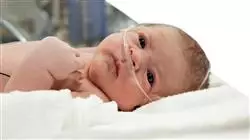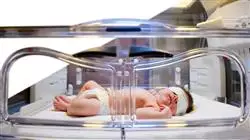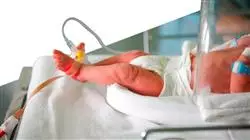University certificate
The world's largest faculty of nursing”
Description
Incorporate into your daily practice the most important advances in intrapartum asphyxia, surgical emergencies and Rh Isoimmunization in Neonatal Emergencies”

From an exhaustive analysis of prematurity to the different pathologies that can derive from it, the midwife must have a series of advanced knowledge in this area, since it falls within their competencies to care for the healthy child up to 28 days of life. During this particularly fragile period for newborns, interventions must be rapid and precise if various complications occur.
This is precisely where the improvement of the midwife's competencies and up-to-date knowledge comes into play. This university TECH program focuses on the most important areas of action in Neonatal Emergencies, bringing together the most important advances made in recent years.
In addition, the teaching staff, made up of professionals with vast experience in the field, have compiled the most effective clinical practice. In this way, the midwife has access to both the most recent scientific findings and the necessary and current practical vision in the most demanding Neonatal Emergency Departments.
All of this is favored by a completely online format, with no fixed schedules or face-to-face classes. The midwives themselves are the ones who distribute their study time, being able to download the entire syllabus from the first day.
Access high quality teaching material, full of multimedia resources and complementary readings to further expand on each topic covered”
This Postgraduate Certificate in Neonatal Emergencies for Midwives is the most complete and up-to-date educational program on the market. The most important features include:
- Practical cases presented by experts in Neonatal Emergencies for Midwives
- The graphic, schematic, and eminently practical contents with which they are created, provide scientific and practical information on the disciplines that are essential for professional practice
- Practical exercises where self-assessment can be used to improve learning
- Its special emphasis on innovative methodologies
- Theoretical lessons, questions to the expert, debate forums on controversial topics, and individual reflection assignments
- Content that is accessible from any fixed or portable device with an Internet connection
Deepen knowledge and modernize understanding of the necessary keys regarding neurological problems in neonates, metabolic disorders and congenital metabolic errors”
The program’s teaching staff includes professionals from the sector who contribute their work experience to this training program, as well as renowned specialists from leading societies and prestigious universities.
The multimedia content, developed with the latest educational technology, will provide the professional with situated and contextual learning, i.e., a simulated environment that will provide immersive training programmed to train in real situations.
This program is designed around Problem Based Learning, whereby the professional must try to solve the different professional practice situations that arise during the academic year. For this purpose, the student will be assisted by an innovative interactive video system created by renowned and experienced experts.
Update your knowledge with a syllabus created by professionals who know the area of Neonatal Emergencies firsthand, giving you the practical perspective necessary for all the scientific theory covered"

You decide when, where and how to take on the full course load, without having to sacrifice any aspect of your personal or professional life"
Objectives
Since the first 28 days of the newborn is a direct responsibility of the midwife, it is important that they have all the necessary knowledge to act quickly in case of emergencies. This program focuses on the most common pathologies and alterations in neonates, as well as on the advances made in the most urgent areas of this field, in order to offer midwives a useful and exhaustive compendium when looking for a very specific refresher course.

Join the largest online academic institution in the world, with a technical and teaching team committed to helping you achieve your professional development goals”
General objectives
- Detect the different obstetric emergencies during pregnancy, delivery and puerperium early on, in order to perform an up-to-date approach and achieve a satisfactory outcome to be able to reduce maternal-fetal morbimortality
- Be able to perform specialist care in each urgent obstetric pathology
- Acquire competencies for emergency neonatal care when the obstetric pathology involves the maternal-fetal binomial
Specific objectives
- Recognize and initiate early management of urgent situations that may occur during the neonatal period
- Demonstrate competency in the application of midwifery care in these situations

You will refine your approach methods in Neonatal Emergencies with the advances and developments that you will learn throughout the program”
Postgraduate Certificate in Neonatal Emergencies for Midwives.
Neonatal emergencies are critical situations that can be life-threatening for a newborn, requiring timely, high-quality medical care. Nursing professionals, including midwives, can play a key role in the detection and management of neonatal emergencies.
Some of the most common neonatal emergencies.
Breathing difficulty: this is a potentially life-threatening medical emergency that can happen in newborns. Midwives can help in the early detection of this condition and assist in the application of mechanical ventilation if necessary.
Hypoglycemia: when a newborn's blood glucose level is too low, it can cause a range of serious symptoms, including seizures. Midwives can assist in early identification of hypoglycemia, monitoring of the newborn's blood glucose, and administration of glucose solutions if necessary.
Infections: Newborns have an immature immune system, which can make them more susceptible to infections. Midwives can assist in early identification of possible infections and assist in appropriate medical treatment.
Congenital heart disease: Midwives can assist in the early detection of cardiac symptoms in newborns and can assist in the administration of initial medications if necessary.
To identify these emergencies, midwives need to be alert throughout the labor and newborn care process and be able to make quick and accurate assessments of the newborn's health status. Symptoms to look for and assess include: skin coloration, frequency and quality of crying, heart and respiratory rate, as well as other specific characteristics needed to assess each neonatal emergency.
Upon diagnosis of a neonatal emergency, the midwife should immediately take steps to treat it. In some cases, maneuvers such as mechanical ventilation, medications, cardiopulmonary resuscitation, among others, may be performed.
It is important for midwives to have specialized training in newborn care, especially in the early assessment of neonatal emergencies. In the event of a neonatal emergency, immediate and expert medical attention should be sought.







